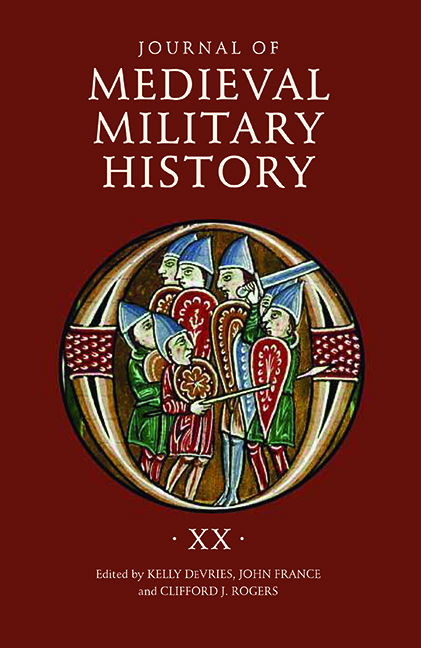Book contents
- Frontmatter
- Contents
- List of Illustrations
- 1 De velitatione bellica and the Georgian Art of War During the Reign of David IV
- 2 The Afterlife of the Medieval Christian Warrior
- 3 More Accurate Than You Think: Re-evaluating Medieval Warfare in Film
- 4 Raising the Medieval Trebuchet: Assembly Method and the Standing of a Half-scale Machine
- 5 Cum Socio Eiusdem: Military Recruitment in the Armies of Edward I Among the Sub-Gentry
- 6 Two Walls of Protection: Queen Elionor of Sicily and Bishop Berenguer de Cruïlles of Gerona During the 1359 Naval Campaigns of The War of the Two Pedros
- 7 The Lancegay and Associated Weapons
- 8 “I intend to give him battle.” Battle-Seeking in a Civil War Context: Toro (1476)
- 9 Discovery of an Early Sixteenth-Century Battle Plan from the Archdiocesan Archive in Ljubljana
- List of Contributors
- Journal of Medieval Military History 1477-545X
2 - The Afterlife of the Medieval Christian Warrior
Published online by Cambridge University Press: 07 October 2022
- Frontmatter
- Contents
- List of Illustrations
- 1 De velitatione bellica and the Georgian Art of War During the Reign of David IV
- 2 The Afterlife of the Medieval Christian Warrior
- 3 More Accurate Than You Think: Re-evaluating Medieval Warfare in Film
- 4 Raising the Medieval Trebuchet: Assembly Method and the Standing of a Half-scale Machine
- 5 Cum Socio Eiusdem: Military Recruitment in the Armies of Edward I Among the Sub-Gentry
- 6 Two Walls of Protection: Queen Elionor of Sicily and Bishop Berenguer de Cruïlles of Gerona During the 1359 Naval Campaigns of The War of the Two Pedros
- 7 The Lancegay and Associated Weapons
- 8 “I intend to give him battle.” Battle-Seeking in a Civil War Context: Toro (1476)
- 9 Discovery of an Early Sixteenth-Century Battle Plan from the Archdiocesan Archive in Ljubljana
- List of Contributors
- Journal of Medieval Military History 1477-545X
Summary
Moving past the truism that the military and religious elites of medieval Europe did not see eye to eye over how to practice a violent profession under the aegis of a pacifist theology, this essay looks at the combinations of both practices and presuppositions about eternity that enabled some medieval Christian warriors to harmonize their warfare with the promises of what awaited them after death. Those promises were, of course, both negative and positive. One thing that becomes quickly unavoidable is the immanence of the Beyond: the afterlife was not only a place/time to arrive at, but an elastic phenomenon impinging on the here-and-now. The Escher-like quality of eternity meant that martial elites not only paid ahead to reduce their purgatorial sentences, they also invested now for the souls of the already dead, and they expected that their preferred saints, as well as their relatives and friends in the afterlife, could intervene in living affairs, including battles. Far from being guilt-ridden over the violent deeds required by their profession, medieval Europe's Christian elite viewed the afterlife as still having a beneficial (and approving) role to play in contemporary warfare. The very existence of martial saints indicated as much, besides offering another title to earn. Finally, in a further wrinkle, the history of some warriors demonstrated an earthly afterlife as their martial fame was maintained or even completely rebuilt by succeeding generations, again in a reciprocal interplay of military accomplishment and presumed heavenly reward.
Introducing the Problem
This study's title might tease some into wondering if I plan to take a thoroughly medieval pilgrimage to see the sights and moral lessons supposedly awaiting warriors in Heaven, Hell, and Purgatory. While such an apocalyptic narrative, especially if its nastier travails occurred in the first person, would doubtless catch the interest of my students, it rather obviously cannot withstand the rational skepticism at the heart of historical study. And yet: even though the world beyond may be off-limits to the scientific scholar, it is not actually terra incognita; this is because the afterlife, whatever it may (or not) be, is a reflection, quite often a projection, of concerns and convictions that matter on this side of the metaphorical veil.
- Type
- Chapter
- Information
- Journal of Medieval Military HistoryVolume XX, pp. 17 - 34Publisher: Boydell & BrewerPrint publication year: 2022



